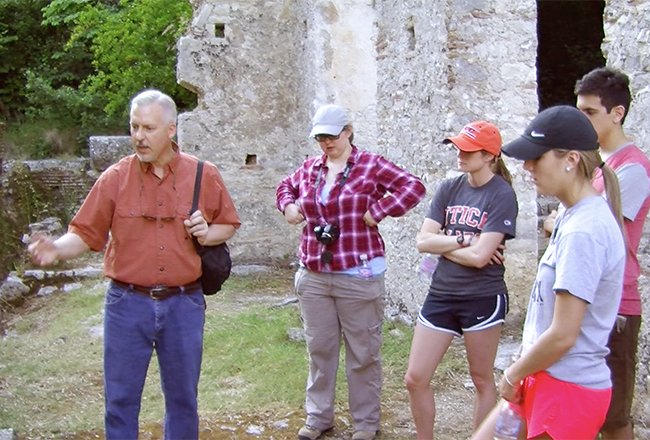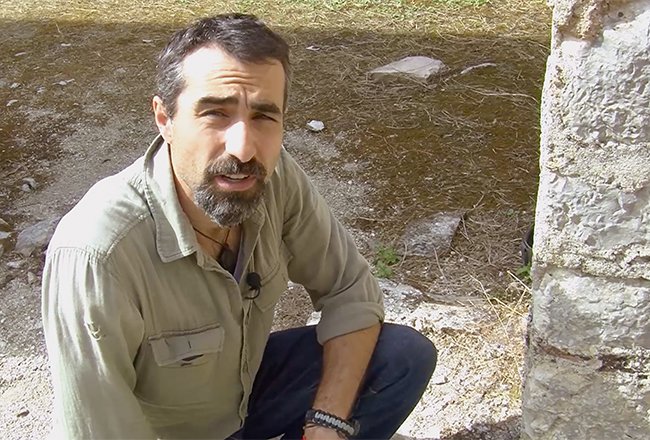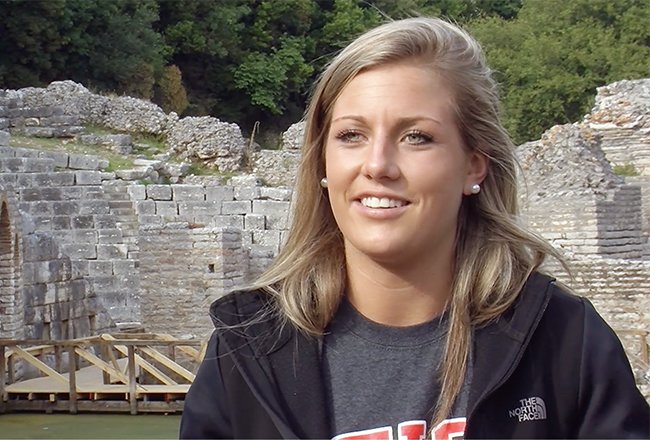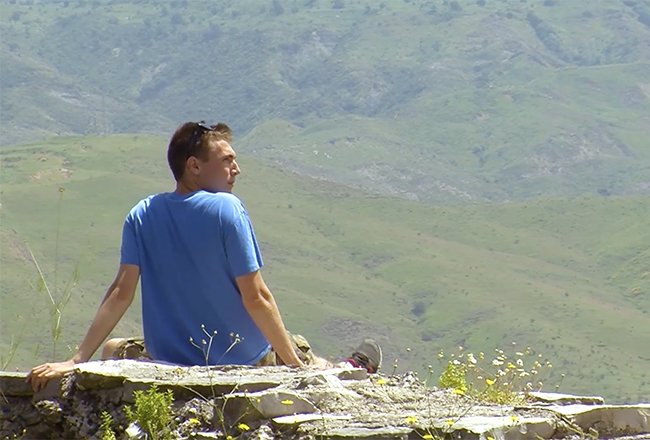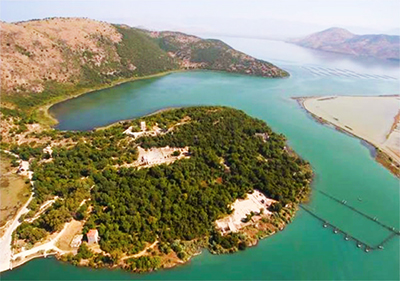
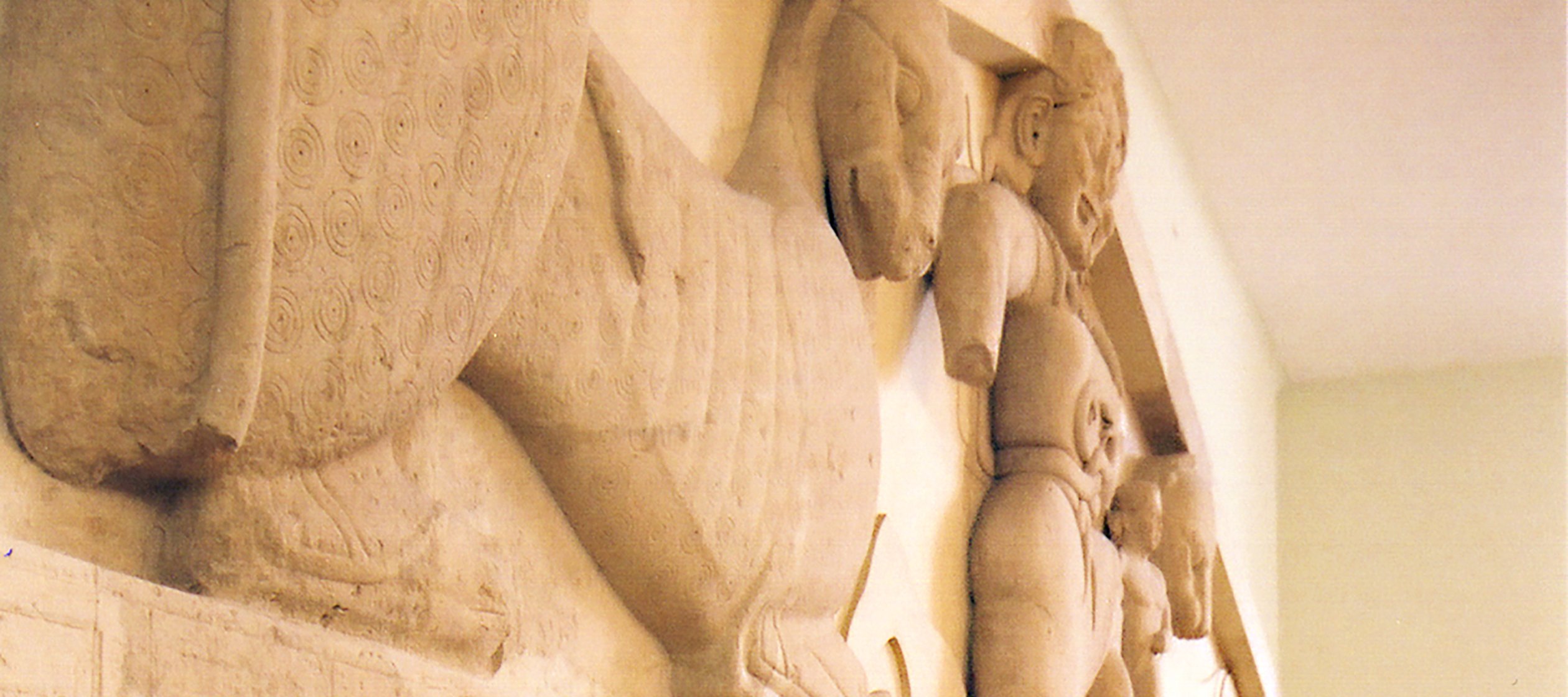
Forensic Anthropology/Bioarchaeology Field School
Meet interesting people ... who lived 1,000 years ago.
Field School in Albania and Greece
The itinerary for our 2025 program is now posted. The program is open to students and graduates from all colleges and universities and no previous experience is required. Non-credit travelers are also welcome to participate.
How To Join Us
For detailed information and an application, please contact Dr. Thomas Crist at tcrist@utica.edu

Program Details
Learn more about what this exciting program has to offer, and find out how to participate.
2025 ITINERARY
(Sample - program will vary from year to year)
Please note: All times are local to their respective countries: Albanian time is 6 hours ahead of US Eastern Daylight Savings Time. Greek time is 7 hours ahead of US Eastern Daylight Savings Time. Itinerary is subject to revision.
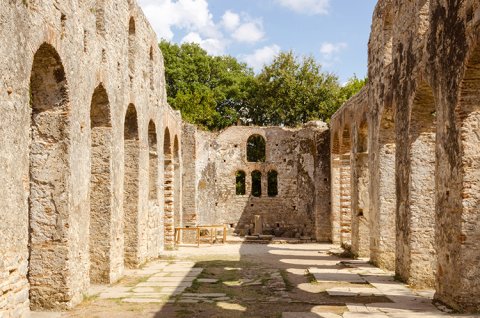
EXPEDITION PART I: ALBANIA
Monday, 5/12
Depart the United States for Albania
Day 1: Tuesday, 5/13 | Program Begins
2:30 PM: ALL expedition members meet at Tirana International Airport (TIA)
3:30 PM: Check-in at Hotel Livia
Welcome Dinner and Tirana Orientation
Days 2 and 3: Wednesday, 5/14 and Thursday, 5/15
(2½ days total)
Class Meetings
Tirana activities and events1
- National Archaeology Museum
- National Gallery of Art
- Bunk’Art/Communist History Museum
- Marubi Academy of Film and Multimedia
- Human Rights in Albania
Day 4: Friday, 5/16
8:00 AM: DEP Tirana (by chartered bus)
3:00 PM: ARR Butrint2/Check-in at Hotel Livia
Days 5-15: Saturday, 5/17 - Tuesday, 5/27
(11 days total)
Class meetings and anthropology laboratory sessions
Regional activities and events1
- Saranda
- Beaches of Ksamili
- Blue Eye Spring
- City of Gjirokastra2
EXPEDITION PART II: CORFU, GREECE
Day 16: Wednesday, 5/28
8:00 AM: Leave Hotel Livia for Saranda Port
10:30 AM: DEP Saranda for Corfu Old City2 (by ferry)
1:00 PM: ARR Corfu (note + 1 hour time zone change)
2:00 PM: Check-in at Hotel Konstantinoupolis
Total sea trip duration: 1½ hours
Day 17: Wednesday, 5/29
(1½ days total)
Corfu Old City activities and events1
- British Cemetery: Archaeology and Iconography of Historical Grave Markers
Day 18: Thursday, 5/30 | Program Ends
6:30 AM: Leave Hotel Konstantinoupolis for Corfu International Airport (CFU)
Depart Corfu for flights to the United States
Most flights arrive in the United States on the same day
1. Note that activities vary and are subject to change or cancellation.
2. Butrint, Gjirokastra, and Corfu are UNESCO World Heritage Sites.
Program and Course Description
This experiential learning program provides students with practical information about the methods of forensic anthropology, bioarchaeology, the appropriate and respectful recovery and handling of human remains, and paleopathology. In addition, students will explore regional history and cultural traditions through field trips and museum visits including a day-trip to the UNESCO World Heritage Site of Gjirokastra, Albania and one and a half days in the Old Town of Corfu, Greece.
Students may enroll in the accompanying six-credit course (Archaeological Field School, ANT 347/547) but are not required to do so to participate in the program. Students who enroll for credit will take a laboratory practical before we leave Albania and will submit a research paper or project on an appropriate topic of their choice in August.
In 2025, the field school will be taught primarily at Butrint National Park in southwestern Albania, together with visits to Tirana, Gjirokastra, and Corfu. The primary topical area this year is forensic anthropology and the analysis of human skeletal remains with corollary discussions on paleopathology, forensic science, mass fatality and disaster planning, human rights investigations, historical American burial grounds, heritage tourism, museum exhibits, and Balkan culture.
The fieldwork component of the course will run from May 13 to May 29, 2025 excluding the trans-Atlantic travel days. At Butrint, classes typically will meet 8:30 AM-4:30 pm each day with breaks for lunch. Lectures and discussion typically occur in the morning, with laboratory exercises involving actual human remains in the afternoon. Students will spend at least 80 hours in class over the fieldwork component of the course, not including field trips to various archaeological sites and museums. There is also plenty of free time available for participants to explore the rural villages near Butrint, relax on the nearby beaches of Ksamili, and enjoy the waterside restaurants, cafes, and clubs in the city of Saranda.
Participants in this program will learn the methods of forensic anthropology and bioarchaeology through the examination and analysis of human skeletal remains previously excavated at Butrint. We will also examine and document skeletal lesions indicative of disease, trauma, repeated activities, and taphonomy.
As part of the course, participants will visit and critically evaluate the Albanian National Museum of History and the Albanian Archaeological Museum in Tirana as well as the Butrint Archaeological Museum. We will also visit other museums in Tirana and Gjirokastra and the nineteenth-century British Cemetery at Corfu.
Outline of Program Topics
Days 1-4 (Tirana and Butrint)
Albanian archaeology and history
Modern Balkan culture and society
Historic preservation and museum exhibits
Communism in Albania
Human rights
Survey of forensic sciences
Ethics in archaeology and biological anthropology
Days 5-15 (Butrint)
Forensic archaeology
Bioarchaeology
Police protocols
Chain of possession
Human osteology
Examination and analysis of human remains
Paleopathology
Perimortem trauma
Postmortem mutilation
Taphonomy
Deviant burial
Forensic pathology and autopsy
Expert witnesses and courtroom testimony
Mass fatality incidents
Politics of archaeology
Descendant community partnering
Heritage tourism
Graduate school preparation and applications
Careers in archaeology and forensic anthropology
Days 16-17 (Corfu)
Greek archaeology and history
Heritage tourism
Historical cemeteries
Iconography of historical grave markers
Course Requirements
Students may choose to enroll for six (6.0) credits in the course that accompanies the field school program. Field school participants are not required to enroll in the accompanying course. Tuition for the course is separate and paid in addition to the program fee.
The course title is “Archaeological Field School” (ANT 347/547) and may be taken for either undergraduate or graduate-level credit. Students earn a letter grade in this course, which is open to all majors. No minimum GPA is required. The prerequisites are: ANT 101 or permission of the instructor.
The course runs until August and is eligible for financial aid. Course credit is transferable to all colleges and universities. Students must, however, obtain permission from their Registrar’s Office to transfer the credits prior to beginning the field school program.
Thomas A. Crist, Ph.D.
Harold T. Clark, Jr. Professor Emeritus of Anthropology and Anatomy
Distinguished Professor of Physical Therapy
Co-Director, Center for Ergonomic Analysis and Research
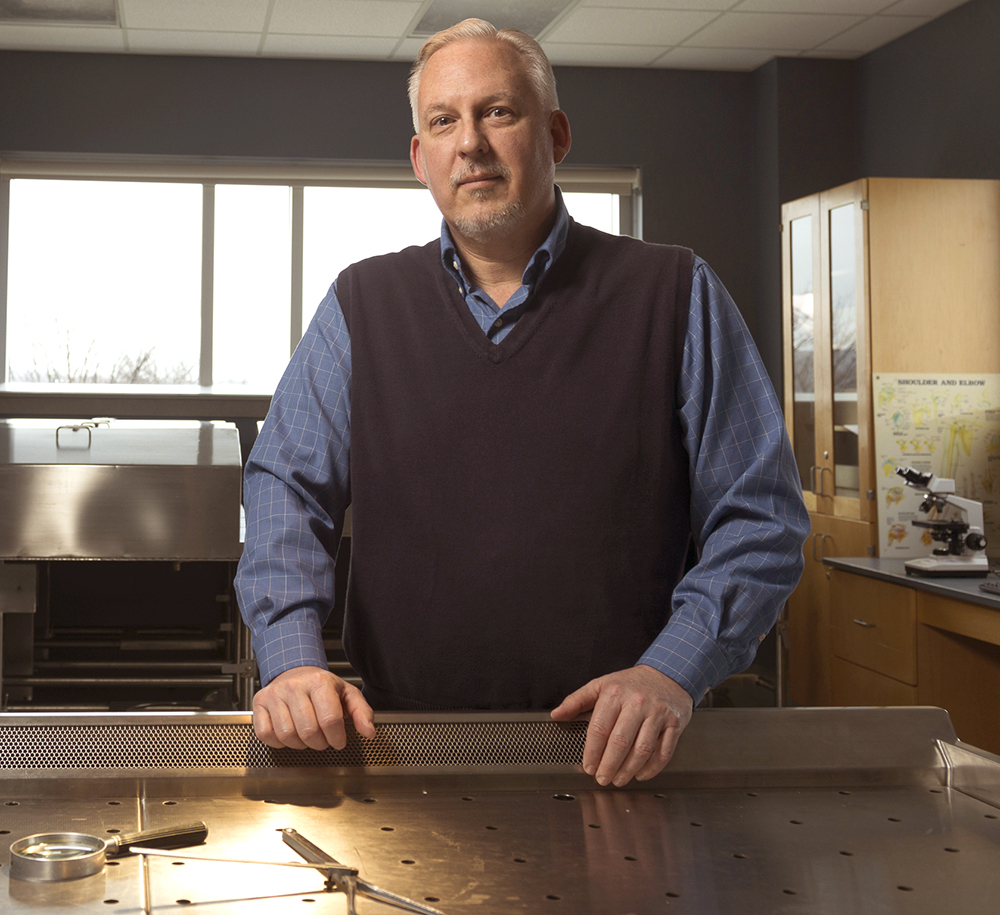
Previously Director of Archaeological Services at Kise Straw & Kolodner Inc. in Philadelphia and now a consultant to numerous cultural resources management firms, county coroners, and police departments, Dr. Crist began serving as the Forensic Anthropologist for the Philadelphia Medical Examiner’s Office in 1990. He is a member of the U.S. Public Health Service’s Disaster Mortuary Operational Response Team (DMORT) and served two deployments assisting in the recovery and identification of victims from the World Trade Center attacks in 2001. In 1992, Dr. Crist was named an Adjunct Professor at the School of Dental Medicine at the University of Pennsylvania, where he taught an annual short course in Forensic Dentistry and Anthropology every spring for 20 years. In 1994, Dr. Crist was one of three co-founders of the American Academy of Forensic Science’s Young Forensic Scientists Forum and served as the group’s first secretary. A Fellow of the American Academy of Forensic Sciences, he is now the Chair of the Anthropology Section’s J. Lawrence Angel Forensic Anthropology Student Paper Award Committee.
Dr. Crist earned his Doctorate in Biological Anthropology from Temple University in 1998. He also holds a Master of Arts in Anthropology/Public Service Archaeology from the University of South Carolina (1990) and a Bachelor’s degree in Archaeology and Classics from Rutgers College (1987). Dr. Crist has directed over 20 historical cemetery excavations throughout the United States including a number of projects in Philadelphia: the Tenth Street First African Baptist Church Cemetery, Revolutionary War burials at Washington Square, the Second Presbyterian Church Cemetery, and two burial grounds used by the Philadelphia Almshouse and the later Blockley Almshouse. He also directed excavations and has analyzed human remains from Chambers Street in Lower Manhattan, the Spring Street Presbyterian Church Cemetery in Greenwich Village, the Wampanoag Burial Ground at Martha’s Vineyard, Historical Cemeteries 86 and 88 in Johnston, Rhode Island, the Portsmouth African-American Burial Ground in New Hampshire, and the earliest French colonial burial ground discovered to date in the New World at St. Croix Island, Maine. The Discovery Health Channel’s series Skeleton Stories featured two of Dr. Crist’s projects in separate episodes that premiered in the fall of 2006.
In 2001, Dr. Crist joined the faculty at Utica University where he teaches Human Gross Anatomy in the Doctor of Physical Therapy Program, courses in the Sociology/Anthropology Program, and an Interprofessional Education course in Cairo, Egypt. He has been accepted as an expert witness and testified in hearings and criminal trials in the Criminal Court and Orphans’ Court of Philadelphia as well the Supreme Judicial and Superior Courts in York County, Maine. He is the author of more than 100 cultural resources reports and professional publications on topics in forensic anthropology, bioarchaeology, paleopathology, the African diaspora, historical urban archaeology, the history of autopsy and medical education, ergonomics, and public outreach efforts among minority descendant communities.
Kathleen L. Wheeler, Ph.D.
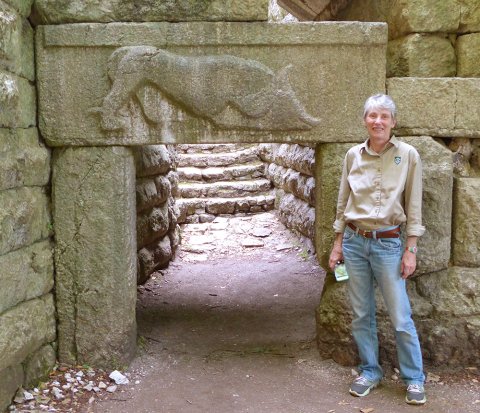
Dr. Kathleen Wheeler is the Co-director of the Forensic Anthropology/Bioarchaeology Field School. A true pioneer in archaeology and historic preservation, Dr. Wheeler is one of the first women in the United States to open her own cultural resources management consulting practice. She established Independent Archaeological Consulting, LLC in Portsmouth, NH in 1990 and retired as Principal and Director in 2020. A Research Associate at Utica University, Dr. Wheeler participated as a student in the Field School in 2015 and has subsequently served as Co-director every year since.
Dr. Wheeler completed her Bachelor’s degree in anthropology at the University of New Hampshire in 1981. As an undergraduate, she spent her junior year abroad at the Faculté de Dijon, France and the following spring semester living in Jerusalem through a Brandeis University program. Dr. Wheeler then worked as a consulting archaeologist for several years before enrolling at the University of Arizona to study with Dr. William Dever, a renowned scholar in Israeli archaeology. Due to the first Persian Gulf War, Dr. Wheeler abandoned her plans to conduct dissertation research in Jordan and turned to historical archaeology in New England. Dr. Wheeler’s dissertation focused on site formation processes in an urban setting and nineteenth-century households as the units of analysis at the Strawbery Banke Museum property in Portsmouth, NH.
Dr. Wheeler has directed a broad range of cultural resource management projects that reflect all aspects of archaeology. Among these were dozens of bioarchaeological projects located throughout New England. Consequently, Dr. Wheeler’s expertise includes mapping of the surface elements of burial grounds; documentation and preservation of grave markers; recovery of human skeletal remains from marked and unmarked graves; examination and analysis of coffins and mortuary artifacts; partnering and consultation with descendant communities; and planning for the memorialization and reburial of human remains after relocation.
Among Dr. Wheeler’s most significant projects is the excavation of the eighteenth-century Portsmouth African Burial Ground, the earliest African-American cemetery found to date in New England. Between 2003 and 2008, Dr. Wheeler’s firm documented the location of at least 21 burials and recovered human skeletal remains from eight graves. In 2015, she coordinated the Homecoming Ceremony and reburial of the remains in a new memorial park with members of the community and officials from the City of Portsmouth. Dr. Wheeler calls this project “the highlight of my career in archaeology.”
Regarding her work in bioarchaeology, Dr. Wheeler said “I love archaeology in almost all aspects of fieldwork, as a kind of kinetic puzzle with no known number of pieces and a high probability of many missing pieces. Bioarchaeology is a special form of archaeological investigation that offers insights into one of the most emotional events of human life – the treatment of a loved one in death.
“The excavation of a grave provides an intimate look at a person’s last set of clothing, her hairpins, his dentures, a child’s favorite toy. We expose the edges of a grave shaft and determine whether it was excavated with a spade or a straight-edged shovel, and whether or not the sides were carefully hewn or hurriedly dug. We see the type of hardware that was chosen for the coffin, if the size of the nails match, and the presence or absence of a viewing pane. We then make educated guesses about the investment by the living in the funerary treatment of their lost loved one.”
“Each of these subtle clues tells the archaeologist something about the way the person was viewed in life by their family and friends, and all of this is before we look at the bones and teeth to begin reconstructing the person’s life story through their remains.”
PASSPORTS
You will need a valid passport to travel abroad. Your passport must be valid until at least January 1, 2026. For information on applying for a new passport or renewing one that has expired, go to the State Department’s Web site:
www.travel.state.gov/passport
You will need to apply in person if you are applying for a U.S. passport for the first time; if your currently valid U.S. passport has been lost of stolen; if your expired U.S. passport is not in your possession; if your previous U.S. passport has expired and was issued more than 15 years ago; or if your previous U.S. passport was issued when you were under 16.
If you need to obtain a passport for the first time, you must go in person to one of 6,000 passport acceptance facilities located throughout the United States with:
- two photographs of yourself;
- proof of U.S. citizenship (e.g., an original birth certificate); and
- a valid form of photo identification such as a driver’s license.
Acceptance facilities include many Federal, state, and probate courts; post offices; some public libraries; and a number of county and municipal offices.
VACCINATIONS
The Centers for Disease Control recommend that travelers to Albania and Greece talk with their physicians about receiving the appropriate vaccinations at least 4-6 weeks before the trip to allow time for them to take effect. For all travelers, this includes routine vaccinations (measles-mumps-rubella (MMR) vaccine, diphtheria-tetanus-pertussis vaccine, varicella (chickenpox) vaccine, and polio vaccine) and your yearly flu shot. For most travelers, vaccination for hepatitis A is also recommended. For some travelers, vaccinations against hepatitis B, rabies, and yellow fever are also recommended.
Please refer to the Centers for Disease Control's web pages for Albania (https://wwwnc.cdc.gov/travel/destinations/traveler/none/albania#vaccines-and-medicines) and Greece (https://wwwnc.cdc.gov/travel/destinations/traveler/none/greece?s_cid=ncezid-dgmq-travel-single-001) for additional information.
Travelers’ diarrhea is the most common travel-related ailment. All travelers should bring along an antibiotic and an antidiarrheal drug to be started promptly if significant diarrhea occurs. A quinolone antibiotic is usually prescribed: either ciprofloxacin (Cipro) (PDF) 500 mg twice daily or levofloxacin (Levaquin) (PDF) 500 mg once daily for a total of three days. An antidiarrheal drug such as diphenoxylate (Lomotil) (PDF) or loperamide (Imodium) should be taken as needed.
HEALTH INSURANCE
Important: Utica University will provide you with health insurance coverage while you are participating in our field school program. We will enroll all participants in the insurance program as part of your program fee. This insurance plan includes emergency repatriation flight coverage. An insurance card and policy information will be provided before departure.
ESSENTIAL PHYSICAL ABILITIES FOR PARTICIPANTS
Participants on this trip need to be in good overall physical health. Unassisted, you must be able to:
- carry your luggage for distances up to several hundred yards/meters;
- walk distances of several hundred yards/meters on flat to moderately steep, uneven surfaces;
- climb stairs, including uneven steps without handrails;
- take the one-hour ferry trip from Saranda to Corfu; and
- travel for up to 10 hours on the trans-Atlantic flights and in the coach (bus) that we charter in Albania.
You will be required to sign a statement acknowledging that you can perform these essential functions when you sign up for the trip.
All participants should be aware that the Americans with Disabilities Act is not applicable outside the United States and that facilities for disabled individuals are very limited in Albania and Greece.
BEHAVIORAL EXPECTATIONS
Traveling and living in a group for almost one month without the amenities most Americans take for granted is stressful and occasionally difficult. Participants must be prepared to be flexible, cooperative, and sensitive to the needs and feelings of fellow travelers and the cultural differences in the countries we visit. All members of the group must be able to deal calmly and effectively with stressful situations, maintain their composure at all times, and avoid aggressive behavior.
Any emotional or psychological conditions that may affect a participant’s ability to meet these behavioral expectations must be identified and discussed with the program directors before you sign up for the trip.
Please Note:
Utica University works diligently to ensure the safety, security, and health of all faculty, staff, and students, whether on campus or traveling as part of the university’s international education experiences. Utica University, however, will not be liable for sickness, psychological disorders, or injuries that participants may sustain during the course. If required, the course directors will make every reasonable effort to assist in securing appropriate medical care for all participants but each participant must be responsible for their own health and safety.
Neither Utica University nor the course directors will be liable for items, money, or documents that may be lost by or stolen from participants during the trip.
Utica University works diligently to ensure the safety, security, and health of all faculty, staff, and students, whether on campus or traveling as part of the university’s international education experiences. Utica University, however, will not be liable for sickness, psychological disorders, or injuries that participants may sustain during the course. If required, the course directors will make every reasonable effort to assist in securing appropriate medical care for all participants but each participant must be responsible for their own health and safety.
Neither Utica University nor the course directors will be liable for items, money, or documents that may be lost by or stolen from participants during the trip.
Program Fee
Fee for the 2025 program is $3,100.00. The program fee covers:
- all lodging with private bathrooms (double occupancy);
- transportation in Albania and Greece (chartered bus and hydrofoil);
- breakfast, lunch, and dinner every day (except the trans-Atlantic travel days);
- all entrance fees to museums and historical sites; and
- all lectures, demonstrations, and laboratory activities.
Please note that the program fee does not include the cost of your flights. We will assist you to make your trans-Atlantic flight arrangements if you prefer to travel with our faculty members and participant group, or you may choose to reserve your own flights and meet us in Tirana, Albania and then fly home from Corfu, Greece.
Note:
Upon acceptance of their application, all participants must submit a NONREFUNDABLE deposit of $750.00 to the Center for Student Success at Utica University. The remaining balance of the program fee must be paid in full by April 1, 2025. Utica University will refund the deposit in full if the program is cancelled.
Tuition for ANT 347/547 (Archaeological Field School)
Tuition
For 2025, tuition for the six-credit course (ANT 347/547; Archaeological Field School) for all students is $1,200.00. This is the total for the course, not per credit.
Tuition is in addition to the program fee that all participants pay and must be paid prior to departure for Albania unless other arrangements are made with the University.
Please note: travelers are not required to enroll for the six credits to fully participate in our field school program.
Financial Aid
For Utica University students, this program qualifies for most financial aid packages. Students from outside Utica University should contact their own school’s financial aid office for information on funding their participation. Utica University does not currently offer scholarships to participate in our Field School program.
Utica University reserves the right to cancel this course for any reason, without penalty. If the course is cancelled, Utica University will make a full refund to applicants including the deposit.
Utica University will not be liable for any costs incurred by a participant in preparation for the trip, including nonrefundable or restricted airline tickets. Utica University also will not be liable for costs associated with any connecting flights that participants may miss after the program ends. Participants who miss any flights during the trip are responsible for their own costs to continue in the course or to return home.
Utica University does NOT provide travel insurance and recommends that each individual consider purchasing their own travel insurance policy in the event that the participant cannot attend the course.
Applicants may cancel their reservation in the course up to two weeks prior to departure with a full refund, less the deposit. Cancellations after that date cannot be refunded.
Contact Us
Thomas Crist, Ph.D.

Thomas Crist, Ph.D.
Harold T. Clark, Jr. Professor Emeritus of Anthropology and Anatomy
(315) 792-3390
Intro to the Field School
Professor Thomas Crist, Ph.D., program director, offers a brief overview of the Forensic Anthropology Field School.
Butrint Guided Tour
Field School instructor Michael Washburn, M.A., gives a walking tour of Butrint's archaeological sites and explains their historical significance.
Ancient Footprints
Field school participant and student Katelyn Briggs talks about walking in the footsteps of ancient people in Butrint, Albania.
Top of the World
Student Eddie Levine describes the stirring sights and sounds of southern Albania ... as well as his first taste of eel.
More about this program
2018:
A Probable Case of Extradural Meningioma in a Twentieth-century Cranium from the Francisc I. Rainer
Anthropological Collection in Bucharest, Romania. Shannon Caldwell, Thomas A. Crist, and Mihai Constantinescu. Presented at the 87th Annual Meeting of the American Association of Physical Anthropologists, Austin, TX.
2017:
Differential Diagnosis in the Analysis of a Probable Meningioma presented by a Twentieth-Century Cranium from Romania.
Shannon Caldwell. Presented at the 24th Annual Conference of the Midwest Bioarchaeology and Forensic Anthropology Association, Milwaukee, WI.
2017:
The Earliest Bioarchaeological Evidence of the African Diaspora in Renaissance Romania.
Kathleen L. Wheeler, Thomas A. Crist, Mihai Constantinescu, Andrei Soficaru, and Florina Raicu. Presented at the 50th Annual Society for Historical Archaeology Conference on Historical and Underwater Archaeology, Fort Worth, TX.
2016:
Evidence of Perimortem Trauma and Taphonomic Damage in a WWI Soldier from Romania.
Megan K. Kleeschulte, Kathleen L. Wheeler, Mihai Constantinescu, and Thomas A. Crist. Presented at the 49th Annual Society for Historical Archaeology Conference on Historical and Underwater Archaeology, Washington, DC.
2016:
Bioarchaeological Evidence of the African Diaspora in Renaissance Romania.
Kathleen L. Wheeler, Thomas A. Crist, Mihai Constantinescu, Andrei Soficaru, and Florina Raicu. Presented at the 49th Annual Society for Historical Archaeology Conference on Historical and Underwater Archaeology, Washington, DC.
2014:
Social and Biological Variables in a Case Study of Commingled Remains.
Katherine J. Welch, Linda L. Taylor, Monica Faraldo, and Mihai Constantinescu. Presented at the 79th Annual Meeting of the Society for American Archaeology, Austin, TX.
2013:
Evidence of Scurvy on the Vrina Plain: A Bioarchaeological Study of Infant Skeletal Remains from Ancient Roman Butrint.
Amanda Jones and Thomas A. Crist. Presented at the 82nd Annual Meeting of the American Association of Physical Anthropologists, Knoxville, TN.
Set Apart: Why Were These Men Dumped in that Grave?
Katherine J. Welch, Thomas A. Crist, Linda L. Taylor, Monica Faraldo, and Mihai Constantinescu. Presented at the 82nd Annual Meeting of the American Association of Physical Anthropologists, Knoxville, TN.
Evidence of Possible Interpersonal Violence in a Female Bronze Age Skeleton from Romania.
Elizabeth Williams, Mihai Constantinescu, Thomas A. Crist, and Andrei Soficaru. Presented at the 82nd Annual Meeting of the American Association of Physical Anthropologists, Knoxville, TN.
Tracking Hunnic Cultural Influences through Cranial Deformation.
Kelsey Wilson, Thomas A. Crist, Mihai Constantinescu, and Andrei Soficaru. Presented at the 82nd Annual Meeting of the American Association of Physical Anthropologists, Knoxville, TN.
2011:
Lesion Lessons: A Case Study of Lower Limb Ankylosis and Possible Surgery from Romania.
Jasmine Sidhu, Thomas A. Crist, and Andrei Soficaru. Presented at the 80th Annual Meeting of the American Association of Physical Anthropologists, Minneapolis, MN.
2007:
The Problem-Based Learning Approach to Forensic Anthropology at Butrint National Park, Albania: The International Student Perspective
Alyson E. Jaagumagi, Bo Yeon Kim, Danielle Stollak, and Meisha Bray. Presented at the 59th Annual Scientific Meeting of the American Academy of Forensic Sciences, San Antonio, TX.
2017:
The Public History of Xenophobic Communism: Enver H. Hoxha’s Bunker Exhibition in Tirana, Albania.
Thomas A. Crist, Michael D. Washburn, John H. Johnsen, and Kathleen L. Wheeler. Presented at the 50th Annual Society for Historical Archaeology Conference on Historical and Underwater Archaeology, Fort Worth, TX.
2012:
The Value of the Rainer Institute Collections in Comparative Paleopathology: An Educational Perspective.
Thomas A. Crist and John H. Johnsen. Presented at the Romanian Academy of Science, Bucharest.
2008:
Anthropology at Butrint National Park.
Thomas A. Crist and John H. Johnsen. Presented at the University of Korça, Korça, Albania.
2007:
Heritage Tourism at Butrint National Park.
Thomas A. Crist and John H. Johnsen. Presented at the University of Vlora, Vlora, Albania.
Introducing Forensic Anthropology to Albania Using the Problem-Based Learning Model.
Thomas A. Crist and John H. Johnsen. Presented at the 59th Annual Scientific Meeting of the American Academy of Forensic Sciences, San Antonio, TX.
2006:
Teaching a Forensic Anthropology Field School at Butrint National Park.
Thomas A. Crist and John H. Johnsen. Presented at the Embassy of the United States of America, Tirana, Albania.

I would like to see logins and resources for:
For a general list of frequently used logins, you can also visit our logins page.

